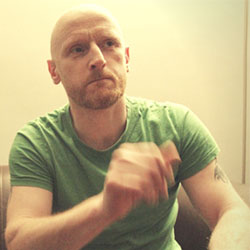There’s something special about the quiet, isn’t there? Most people, craving the constant short-term gratification that worldly stimulation brings, run away from the silence of their own company as fast as possible.
But we don’t, we run towards it.
I didn’t always call myself a writer. Only in the last 12 months since penning my first serious piece of writing have I begun to do so. That short piece of work I called The Artist’s Manifesto.
I always loved the peace of my own company, so the tag writer felt like a natural fit.
Solitude has subsequently become essential to my sense of wellbeing and my creative process.
If you are a writer, then maybe your’s too I guess.
When I was a kid, I would come home from school and spend hours in my room alone, sitting on the bed smoking cigarettes out the cleverly positioned opening of the single glazed aluminium window, contemplating whatever came to mind.
It was my way of escaping from the noise of others with whom I was living.
These days I crave my own company just as much, although now it’s more of a conscious choice to go there. As a kid, it was just something I liked to do, and I did it without questioning the rights or wrongs of it.
Our contemporary societal view, however, is that spending time alone, at best is disadvantageous. At worst it is antisocial and destructive to your mental wellbeing.
There’s something wrong with you, the loner.
Like most writers, I am what many would call quiet and introverted, but certainly not shy. When there is a requirement, I will shake things up and make sure people hear me.
I guess that’s why writing appeals to me.
Many people who do not understand the outward projection of the writer would like to call you and me rude, unsociable or perhaps reclusive. But they don’t understand.
They adhere to popular social stereotypes about what it means to be an acceptable member of society. They will tag you and me as antisocial and suggest all kinds of ways we may overcome our affliction.
And so under the blanket societal ideal of what it means to be successful, we begin the battle of our lives.
To be understood by a society that on the whole, cannot understand.
The Importance of Solitude
Introversion, that internal draw towards the peace and tranquillity of solitude, is not something that needs to be cured or overcome. It is a vital component in the creative process and psychological studies back that up.
In a formidable piece of 1993 research (cited over 8300 times) conducted by Anders Ericsson and his colleagues, titled The Role of Deliberate Practice in the Acquisition of Expert Performance, they found that time spent alone in “deliberate practice” is essential to the evolution of expertise.
Susan Cain, in her book, Quiet: The Power of Introverts in a World That Can’t Stop Talking, she outlines how our contemporary western industrialised culture works against the creative minds of introverted people like you and me.
The popular rhetoric of our culture says we must be outward and engaging; we must work as part of the collective to bring value to the world. But this is a flawed ideology.
Just like Susan Cain, you and I already feel there’s a fundamental flaw in that premise. We already know the value that can be obtained for us and indeed everyone else by us embracing the solitude for extended periods to create our works.
But sometimes it’s difficult.
Sometimes in spite of what we feel inside, the world convinces us that we must conform, row in and be a part of the machine.
We are trained out of individuality and into collectivity as if the latter is somehow better than the former.
From the very first days, we spend away from our mothers we are conditioned towards the collective mind. We are encouraged by the world to leave behind the things that seem so natural to us and join the game.
And so we do.
But it doesn’t last, and if we cannot rediscover the benefits of spending time alone in the bliss of our minds then there is a significant risk that we become torn apart, confused, and isolated in the most real sense of the word.
I guess that’s why I felt the need to write The Artist’s Manifesto. The short book was a way to give heed to the voice that was calling me back to the place I have always felt most productive and creative.
The Artist’s Manifesto promotes Embracing Solitude as a fundamental aspect of the creative process, and it offers us, creative people, the opportunity to accept that part of ourselves that others would discourage.
It is a call to all creative people to graciously present the middle finger to a world that would try to convince us that the solitary way of the creative mind is somehow imperfect.
The book reminds us writers and creatives to permit ourselves to create with passion and integrity without the need for applause.
The Constant Exchange
Life appears to be a constant exchange between what you and I would call “me” – the individual, and everyone else – the world. In reality, the creative process is an exchange between the two – the outside world and the inside world.
As a creative person, you understand the benefit of finding time to be alone and create despite what everyone else may think or say.
But there is a benefit too in taking what we make and returning to the world to show it to others. When we present what we created there is for us the opportunity to complete the process.
Because the creative process is not only about making the thing but also sharing it, and where suitable, taking reward in the form of payment for that thing.
We get to close the loop and be in observation of that unidentifiable, omnipresent thing that exists beyond the surface level mind of busy people.
So it is not either introversion or extroversion, it is not inside or outside that is objectively correct. It is a combination of both that is required for you and me to be happy and become fulfilled.
Solitude is an essential component in the creative process; it is a place we must go to turn the inspiration we receive from the inner and outer world into things of beauty.
Equally, companionship is essential to our wellbeing. However, that doesn’t mean you, and I need to become Mr. or Mrs Saturday Night! That’s someone else job, but it may be yours too if you choose it.
There’s no prerequisite apart from that which you and I decide upon.
If you want to be predominantly outward and engaging, then do that.
If you want to spend most of your time in solitude, then do that.
For me, as a writer and artist, spending time alone is where I’m at my best. It’s where I feel most at home.
Maybe it is for you too.
The secret to life is to put yourself in the right lighting. For some, it’s a Broadway spotlight; for others, a lamplit desk. Use your natural powers — of persistence, concentration, and insight — to do work you love and work that matters. Solve problems. make art, think deeply. – Susan Cain
 Larry is a writer and artist from Dublin, Ireland and is author of the upcoming paperback The Artist’s Manifesto due for release in May 2018. As part of the run up to the launch you can join The Writer’s Giveaway a get in with a chance to win a suite of writer’s tools and memberships worth over $1,900.
Larry is a writer and artist from Dublin, Ireland and is author of the upcoming paperback The Artist’s Manifesto due for release in May 2018. As part of the run up to the launch you can join The Writer’s Giveaway a get in with a chance to win a suite of writer’s tools and memberships worth over $1,900.


